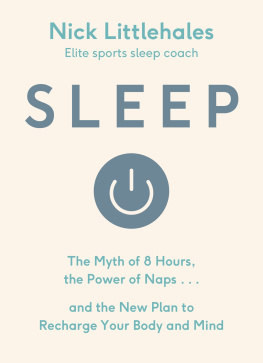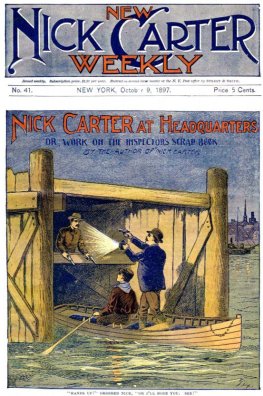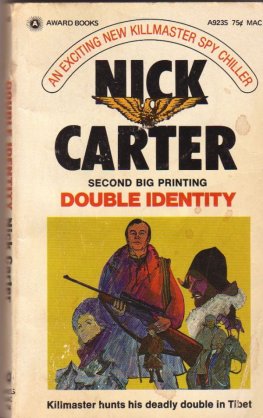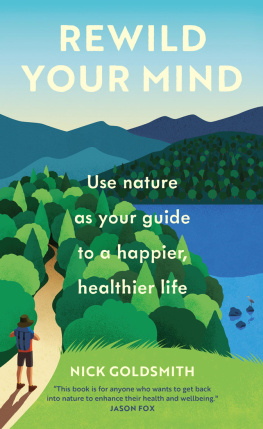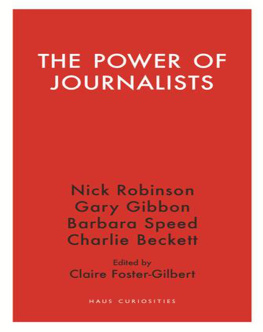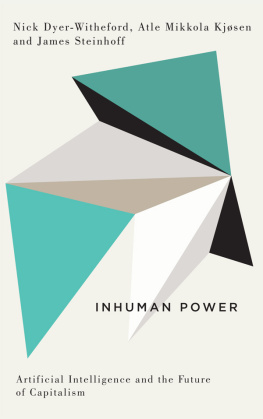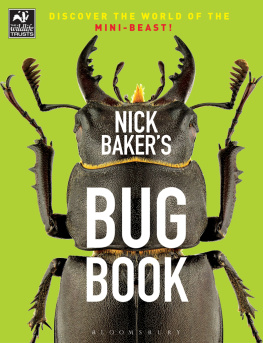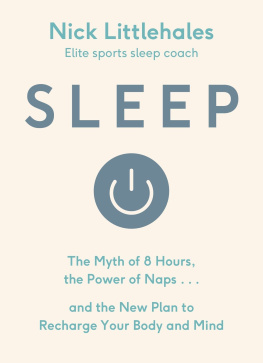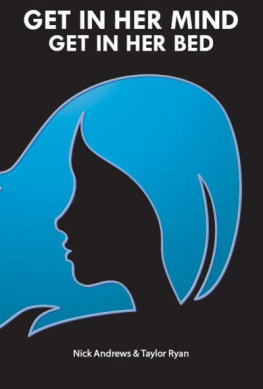Nick Littlehales
SLEEP
The Myth of 8 Hours, the Power of Naps
and the New Plan to Recharge Your Body and Mind
For my father, Herbert James Littlehales
PENGUIN LIFE
UK | USA | Canada | Ireland | Australia
India | New Zealand | South Africa
Penguin Life is part of the Penguin Random House group of companies whose addresses can be found at global.penguinrandomhouse.com.
First published 2016
Copyright Nick Littlehales, 2016
The moral right of the author has been asserted
ISBN: 978-0-241-97598-5
Introduction
Dont Waste Your Valuable Time Sleeping
When I asked the person behind the counter of my local bookshop where the sleep section was, she gave me a quizzical look, turned to her computer and, after some searching, pointed me in what she hoped was the right direction. Up four flights of stairs, in a dark and dusty corner, I finally found it: a small collection of academic tomes on the science of sleep; a handful of volumes on dreams and what they mean, New Age takes on an ageold process.
My hope is that this is not where you found this book.
There is a revolution going on in sleep. For too long it has been an aspect of our lives that we take for granted, and historical patterns suggest weve placed less and less importance on sleep itself (certainly by leaving fewer hours for it). But a burgeoning body of scientific research is drawing links between our poor sleeping habits and an array of health and psychological issues, from type 2 diabetes, heart disease and obesity through to anxiety and burnout. Its time for sleep to take its place in the spotlight. Its time to look at this essential process of mental and physical recovery and see how we can do it better, so that we can get the most out of our waking day and be more effective at work, give our best to our relationships with family and friends, and feel great in ourselves.
Until the mid-1990s we were getting away with it. Most of us took two consecutive days off for granted (otherwise known as the weekend). Our work finished when we left the office or wherever it was we did our jobs and shops were generally closed on Sundays. Then came a seismic change in our lifestyle. The internet and email altered for ever the way we communicate, consume and work, and mobile phones, initially just phone call and texting devices, soon morphed into the little pools of blue light at which we now spend so much of our time gazing. The idea of being constantly connected became a reality, the 247 working mentality was born, and we had to make adjustments to keep up. Overstimulating on caffeine, popping sleeping tablets to come down and switch off, burning the candle at both ends the traditional idea of a good eight hours sleep at night became the stuff of legend.
The result has been extra stresses and strains on relationships and family life. Not only that, some scientists and researchers connect our lack of physical and mental recovery time with a tangible increase in many diseases and disorders. Something has to give.
I am a sports sleep coach. Its a job that is unlikely to come up at your local careers service, and thats largely because its a role Ive managed to fashion for myself.
This journey began when I was the international sales and marketing director of Slumberland, the largest sleeping comfort group in Europe, in the late 90s. I became intrigued about what the top football club in the country did about sleep and recovery. They must have a sophisticated approach to it all, I thought, so I wrote to Manchester United to find out. It turned out that they did nothing. The reply from Sir Alex Ferguson who would soon make history with his treble-winning team asked if Id be interested in coming in and taking a look.
Sleep wasnt considered a performance factor back then, but I was fortunate that sports science was becoming a bigger part of the game and that the curiosity of one of the greatest managers of all time had been piqued. I was equally fortunate that I was able to work with one of the players who had a back problem, and make some adjustments to his routine and products. You cant cure a back injury with a mattress, of course, no matter what some manufacturers might claim, but I was able to have a positive impact on the players management of his condition.
I became more heavily involved with the club, even providing Ferguson himself with some products and advice, as well as the famous class of 92 Ryan Giggs, David Beckham, Paul Scholes, Nicky Butt and the Neville brothers. This top-down approach, where everyone from the manager and coaching staff to the players uses the methods and products Ive recommended, is one I implement to this day.
By this time I was in the process of leaving my role at Slumberland. The world of sleep had begun to engage me beyond simply selling products. I had been chairman of the UK Sleep Council, a consumer education organization set up to advise on and promote better sleep quality, which helped further my knowledge, and it was there that I got to know Professor Chris Idzikowski, a leading expert in the field who would grow to be a valued friend and colleague. Meanwhile, the press had coined my job title, branding me Manchester Uniteds sleep coach. Whats he doing, they asked, tucking the players in at night?
In fact, I was doing things like introducing probably the first training-ground sleep recovery room on the planet at Manchester Uniteds Carrington facility. Lots of top clubs have them now, of course, but that was the first.
Word spread. The Manchester United players in the England team, never the type to suffer second best, soon had Football Association executive Andy Oldknow and England physio Gary Lewin who was also Arsenals physio coming my way. I worked with the national side, having new sleeping products shipped in and advising players on improving their habits. Gary could see the benefit of what I was doing, and he invited me along to Arsenal too, where a new manager by the name of Arsne Wenger was busy changing a lot of the received approaches to football. Another early adopter of sports science, Sam Allardyce, manager of Bolton Wanderers at the time, got me involved too.
Later, I would work with British Cycling advising stars such as Sir Chris Hoy, Victoria Pendleton, Jason Kenny and Laura Trott and Team Sky, including their successful Tour de France campaigns, as part of performance director Sir Dave Brailsfords marginal-gains approach, where I designed portable sleep kits for the riders to sleep on instead of the beds in their hotel rooms. I would be brought in by British Olympians and Paralympians, sports such as rowing, sailing, bobsleigh, BMX and cyclo-cross, as well as by rugby and cricket teams, and many more football clubs, including Manchester City, Southampton, Liverpool and Chelsea.
This revolution in the sporting world wasnt confined to Britain; sleep is universal, after all. I was invited to join up with leading European football clubs such as Real Madrid, where I advised on adapting their luxury training-ground player apartments into the ideal recovery rooms for some of the worlds best players. I worked with the Netherlands womens bobsleigh team before the Winter Olympics in 2014, I coach cyclists from places as far away as Malaysia and I have had conversations with National Basketball Association (NBA) and National Football League (NFL) teams in the USA.

